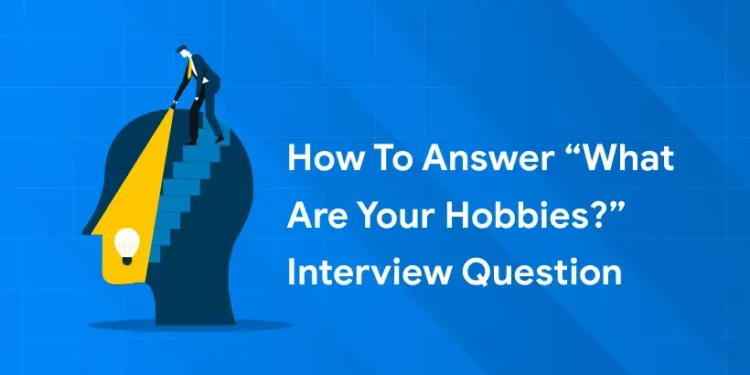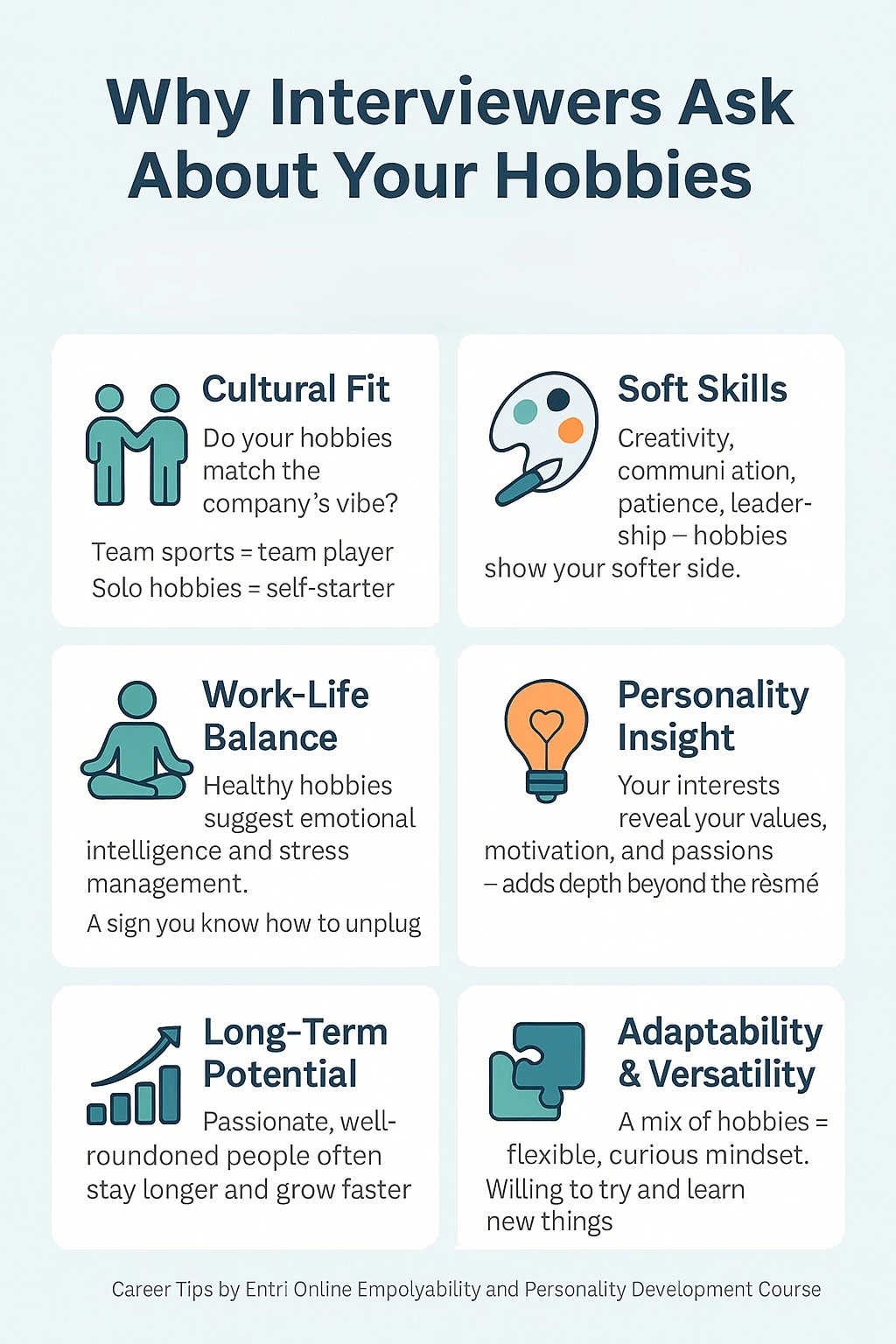Table of Contents
Today’s job market is very competitive. Standing out in an interview is not simple. You have to go beyond showcasing your technical skills and professional experience. Recruiters are sometimes more interested in the person behind the resume. They will ask you a question to gauge your response. “What are your hobbies?”. This question might look simple to you. But recruiters use the answer you give for this question to understand a candidate’s personality, passions, and how they fit into the company culture. In this blog, we will help you approach this question strategically and answer it in a way that highlights your strengths as a candidate for the role.
Want to ace upcoming interviews? Join Entri Elevate’s personality development online course!
What are Your Hobbies: Introduction
Imagine you are in an interview. You are tackling technical questions left and right. But suddenly, a supposedly easy question will come.
What are your hobbies?
It seems a casual and irrelevant question. You will think that the recruiter is just trying to break the ice or put you at ease. This is far from the truth. Never underestimate even questions that might seem too simple. This is an opportunity that the recruiter presents to you to showcase soft skills that are not always obvious on your résumé. In this blog, we will teach you how to answer this question. The key is choosing the right hobbies and framing the answer in such a way that it supports your career narrative.
What is a Hobby?
A hobby is an activity that you enjoy doing when you have free time. It can be for personal growth or just for fun and relaxation. These activities are different from academic responsibilities or professional tasks. Hobbies are solely fuelled by passion and curiosity.
| Type of Hobby | Examples |
| Creative | · Painting
· Drawing · Writing (stories, poetry, journaling) · Photography · Playing instruments · Crafting (knitting, scrapbooking, origami) · DIY projects · Acting or theatre |
| Physical | · Playing sports (soccer, basketball, tennis)
· Hiking · Dancing · Yoga or Pilates · Running or jogging · Swimming · Martial arts · Rock climbing |
| Intellectual | · Reading books
· Chess or strategy games · Learning new languages · Coding or programming · Solving puzzles (crosswords, Sudoku) · Studying history, science, or philosophy · Watching documentaries · Blogging or essay writing |
| Social | · Volunteering
· Joining clubs (book clubs, hobby groups) · Playing team sports · Attending meetups or social events · Hosting game nights · Group travel or tours · Community theater · Organising events or fundraisers |
Your hobbies can tell a lot about your personality, skills and interests.
Boost Your Skills & Kickstart Your Career!
Employability and Personality Development Course by Entri App: Enhance your communication, confidence, and job-ready skills to excel in your career.
Join Now!How to Answer “What are Your Hobbies?” Interview Question?
You should keep the following tips in mind while answering the question ‘What are your hobbies?’.
| Step | How to Answer |
| Choose Relevant Hobbies | · Pick 1–3 hobbies
· Show skills that fit the job · Highlight positive traits |
| Be Honest | · Share real hobbies
· Don’t make things up · Be authentic |
| Add Context | · Explain why you enjoy it
· Show personal or professional growth |
| Keep It Professional | · Avoid sensitive topics
· Skip politics, religion, or anything controversial |
| Be Brief and Focused | · Keep your answer short
· Avoid rambling · Stay on topic |
| Match Company Culture | · Pick hobbies that reflect company values
· Show you’d fit in with the team |
| Connect to Soft Skills | · Highlight teamwork, creativity, or discipline
· Link hobbies to work habits |
Why the Interviewer Wants to Know About Your Hobbies?
Why might an interviewer want to know about our hobbies? Look at the table below to understand better.
| Reason | What Interviewers Learn |
| Cultural Fit | · Do your hobbies match the company’s vibe?
· Team sports = team player · Independent hobbies = self-starter |
| Soft Skills | · Shows creativity, communication, and leadership
· May reflect discipline, patience, or problem-solving |
| Work-Life Balance | · Do you know how to relax?
· Healthy hobbies = emotional awareness · Prevents burnout |
| Personality Insight | · Reveals what motivates you
· Shows values, passions, and habits · Adds depth to your résumé |
| Long-Term Potential | · Passionate, well-rounded candidates tend to stay longer
· Shows you pursue growth outside of work |
| Communication Style | · How clearly and confidently do you speak?
· Are you engaging when talking about your interests? |
| Versatility & Adaptability | · Varied hobbies = flexible mindset
· Openness to trying new things or learning |
What Are Good Hobbies to Mention in an Interview?
Some good hobbies that you can mention in an interview are listed below. We have also included the positive quality or skill that a hobby might represent to your employer.
| Hobby | What It Shows |
| Reading (fiction & nonfiction) | · Focus
· Curiosity · Learning mindset |
| Team sports | · Leadership
· Collaboration · Competitiveness |
| Volunteering (including non-profits) | · Empathy
· Initiative · Community-mindedness |
| Blogging, journaling, and content creation | · Communication skills
· Creativity · Confidence |
| Chess, puzzles, strategy games | · Strategic thinking
· Problem-solving |
| Hiking, running, cycling | · Discipline
· Goal-setting · Stress management |
| Photography, digital photography, filmmaking | · Creativity
· Attention to detail |
| Playing musical instruments | · Patience
· Focus · Coordination |
| Cooking or baking | · Planning
· Experimentation · Multitasking |
| Yoga or meditation | · Mindfulness
· Stress reduction · Self-awareness |
| Gardening or home improvement | · Patience
· Nurturing · Long-term planning |
| Travelling and cultural exploration | · Adaptability
· Open-mindedness · Cultural awareness |
| Mentoring or tutoring | · Leadership
· Communication · Patience |
| Coding personal projects | · Logical thinking
· Problem-solving · Persistence |
| Podcasting | · Communication
· Creativity · Confidence |
| Language learning | · Curiosity
· Discipline · Cultural awareness |
| Book clubs or discussion groups | · Communication
· Critical thinking · Social skills |
Boost Your Skills & Kickstart Your Career!
Employability and Personality Development Course by Entri App: Enhance your communication, confidence, and job-ready skills to excel in your career.
Join Now!Example Answers for What Are Your Hobbies
Some sample answers for the question “What are your hobbies?” are given below. Take them as a format and make up your own answer, and practise it well before attending the interview.
| Role | Sample Answer |
| Creative Role (Graphic Designer) | “I love photography. It’s helped me sharpen my eye for composition and colour, which I bring into my design work. It also keeps me creatively inspired outside of client projects.” |
| Tech Role (Software Engineer) | “I enjoy building small personal coding projects and contributing to open-source communities. It’s a fun way to experiment with new frameworks and stay updated in the fast-moving tech world.” |
| Customer Service Role | “I volunteer with a local food bank on weekends. It’s rewarding to help people directly, and I’ve developed strong communication and problem-solving skills through that experience.” |
| Leadership Role | “I coach a local youth soccer team. It’s helped me become a better leader, mentor, and communicator—skills that translate directly to managing teams in the workplace.” |
When You Don’t Have Any Specific Hobbies – What to Say
You can still showcase your strengths and skills even if you don’t have a popular or classic hobby. You can include the following points in your answer to express that you have curiosity and yearning for self-development. The first thing to do is to mention that you don’t have any specific hobbies. Then you can say that you spend your spare time doing the following things.
- Reading articles on personal development and industry trends.
- Walking and reflecting
- Learning new tools and skills online
- Maintaining a daily routine of jogging and meditation
- Spending time with friends and family
- Enjoying quiet time to reflect and plan
You can learn all these and much more if you join a personality development course. And this is exactly what Entri Elevate offers you! Improve your conversation and body language skills with the help of the best mentors in the Entri personality development course.
Click here to learn more about the Entri Personality development online course! Join now!
What are Your Hobbies: Conclusion
You should keep in mind that when an interviewer asks “What are your hobbies?”, they’re not just making conversation. They are trying to get to know what type of person you are beyond your resume. They are looking into how your interests might enhance your value as an employee. So, answering this question should be done carefully. You should talk about your interests. But this answer should focus more on how your hobby complements your character and professional strengths. You have to frame the answer in such a way that it shows personal growth and aligns with the company’s values.
Boost Your Skills & Kickstart Your Career!
Employability and Personality Development Course by Entri App: Enhance your communication, confidence, and job-ready skills to excel in your career.
Join Now!Frequently Asked Questions
Is it okay to say I don’t have time for hobbies?
Avoid saying this outright. Even light activities like reading, walking, or listening to podcasts can be framed as hobbies.
What if my hobby is watching Netflix or gaming?
That’s fine as long as you frame it positively. For example:
“I enjoy playing team-based video games, which require fast decision-making and communication skills I’ve found useful in collaborative projects.”
Give a sample answer format for the question "What are your hobbies?".
A sample answer format for the question “What are your hobbies? is given below.
“One of my favourite hobbies is [activity]. I enjoy it because [reason], and it’s helped me develop [relevant skill], which I’ve found useful in [related job aspect].”
Should I always relate my hobbies to the job?
Not always, but it’s helpful if at least one hobby demonstrates a transferable skill or quality relevant to the role.
Should I prepare examples in advance?
Yes. Practice one or two thoughtful examples so you’re not caught off guard.












